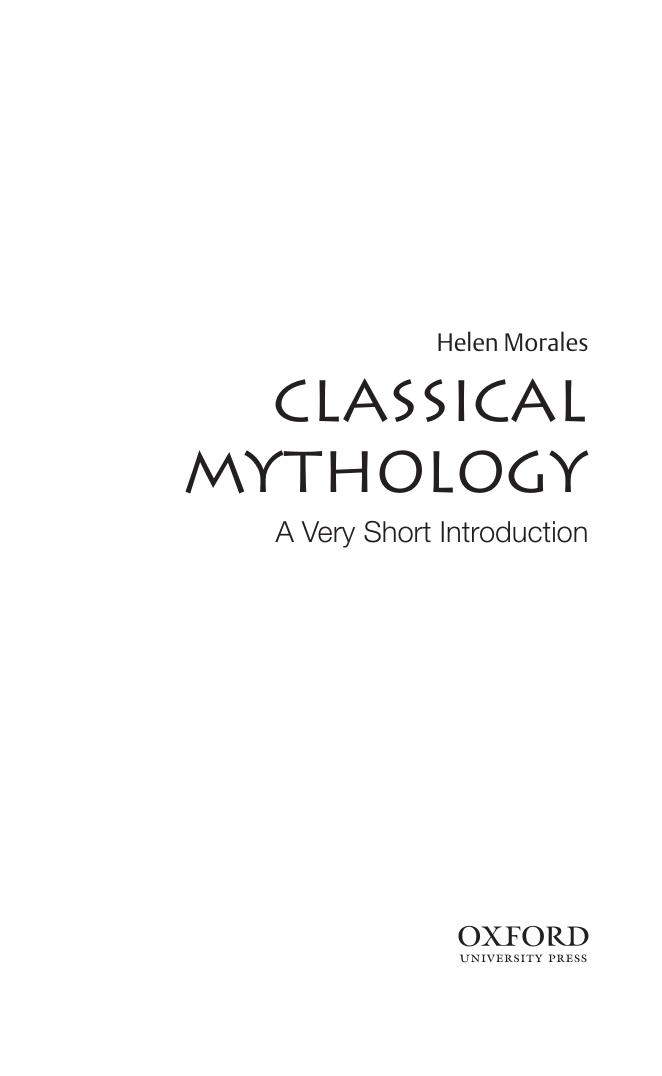Classical Mythology: A Very Short Introduction by Helen Morales

Author:Helen Morales [Morales, Helen]
Language: eng
Format: epub, pdf
Tags: Ancient & Classical, Folklore & Mythology, History, Literary Criticism, Semiotics & Theory, Social Science
ISBN: 9780192804761
Google: g3oRDAAAQBAJ
Amazon: 0192804766
Publisher: Oxford University Press
Published: 2007-08-23T03:00:00+00:00
Know thyself
Freud used classical myths throughout his writings as points of comparison and reference, but only three are discussed at any length: Oedipus, Prometheus, and Medusa. Freud’s interpretation of the Prometheus myth, involving as it does the hypothesis that in order to gain control of fire men had to renounce what he described as the ‘homosexually-tinged desire to put it out with a stream of urine’ failed to gain credibility within the psychoanalytic profession and is probably best forgotten. His interpretation of the decapitated head of the female gorgon Medusa is brief but proved influential. In essence, Freud (and others) suggested that the snaky-haired head, which had the power to petrify those who looked upon it, symbolized female genitalia and men’s fear of them. But it is Freud’s analysis of Oedipus that made the greatest impact.
In Sophocles’ Oedipus the King, which, largely thanks to Freud, has become the most prominent version of the myth, Oedipus has been sovereign of Thebes for many peaceful years, when a plague threatens the city. The Thebans consult an oracle, which replies that the plague will cease when the murderer of Laius has been driven from the land. The action of the play, taut with tension and irony, consists of the slow revelation that it is in fact Oedipus himself who is the murderer of Laius. We learn that Laius had been the previous ruler of Thebes, and when he and his wife Jocasta were expecting a baby boy, an oracle had warned them that the unborn child would one day murder his father. The couple exposed the baby to die, but, unbeknown to them, he was rescued and given to the king and queen of Corinth, who brought him up. When a young man, Oedipus consulted the oracle and was warned to avoid his homeland since he was destined to murder his father and marry his mother. Thinking he was following the oracle’s advice, but not knowing that Thebes rather than Corinth was his homeland, Oedipus left Corinth to go to Thebes. On the way, he got into a fight with a man on the road to Thebes (whom he later learns is his real father, Laius) and slew him. He then arrived at Thebes, where he conquered the Sphinx and was offered the kingdom and Jocasta’s hand in marriage. Unwittingly, therefore, Oedipus had fulfilled the prophecy: he had married his mother and killed his father. When this is finally revealed, Jocasta is unable to bear the knowledge and hangs herself. Oedipus, realizing that he himself is the sickness at the heart of Thebes, gouges out his eyes and leaves the city. The oracle’s predictions had all come true.
The play dramatizes a recurring concern in Greek tragedy’s treatments of the mythic narratives: the profound importance of self-knowledge. Gnothi Seauton: the motto emblazoned on Apollo’s temple at Delphi. Gnothi Seauton: ‘Know Thyself’.
Freud saw the analyst as an Oedipus figure: a seeker of self-knowledge and knowledge of others, no matter what the cost. The process of
Download
Classical Mythology: A Very Short Introduction by Helen Morales.pdf
This site does not store any files on its server. We only index and link to content provided by other sites. Please contact the content providers to delete copyright contents if any and email us, we'll remove relevant links or contents immediately.
| Ancient & Classical | Arthurian Romance |
| Beat Generation | Feminist |
| Gothic & Romantic | LGBT |
| Medieval | Modern |
| Modernism | Postmodernism |
| Renaissance | Shakespeare |
| Surrealism | Victorian |
4 3 2 1: A Novel by Paul Auster(12365)
The handmaid's tale by Margaret Atwood(7750)
Giovanni's Room by James Baldwin(7319)
Big Magic: Creative Living Beyond Fear by Elizabeth Gilbert(5752)
Asking the Right Questions: A Guide to Critical Thinking by M. Neil Browne & Stuart M. Keeley(5752)
Ego Is the Enemy by Ryan Holiday(5412)
The Body: A Guide for Occupants by Bill Bryson(5077)
On Writing A Memoir of the Craft by Stephen King(4925)
Ken Follett - World without end by Ken Follett(4719)
Adulting by Kelly Williams Brown(4564)
Bluets by Maggie Nelson(4542)
Eat That Frog! by Brian Tracy(4518)
Guilty Pleasures by Laurell K Hamilton(4437)
The Poetry of Pablo Neruda by Pablo Neruda(4090)
Alive: The Story of the Andes Survivors by Piers Paul Read(4017)
White Noise - A Novel by Don DeLillo(4000)
Fingerprints of the Gods by Graham Hancock(3985)
The Book of Joy by Dalai Lama(3970)
The Bookshop by Penelope Fitzgerald(3843)
